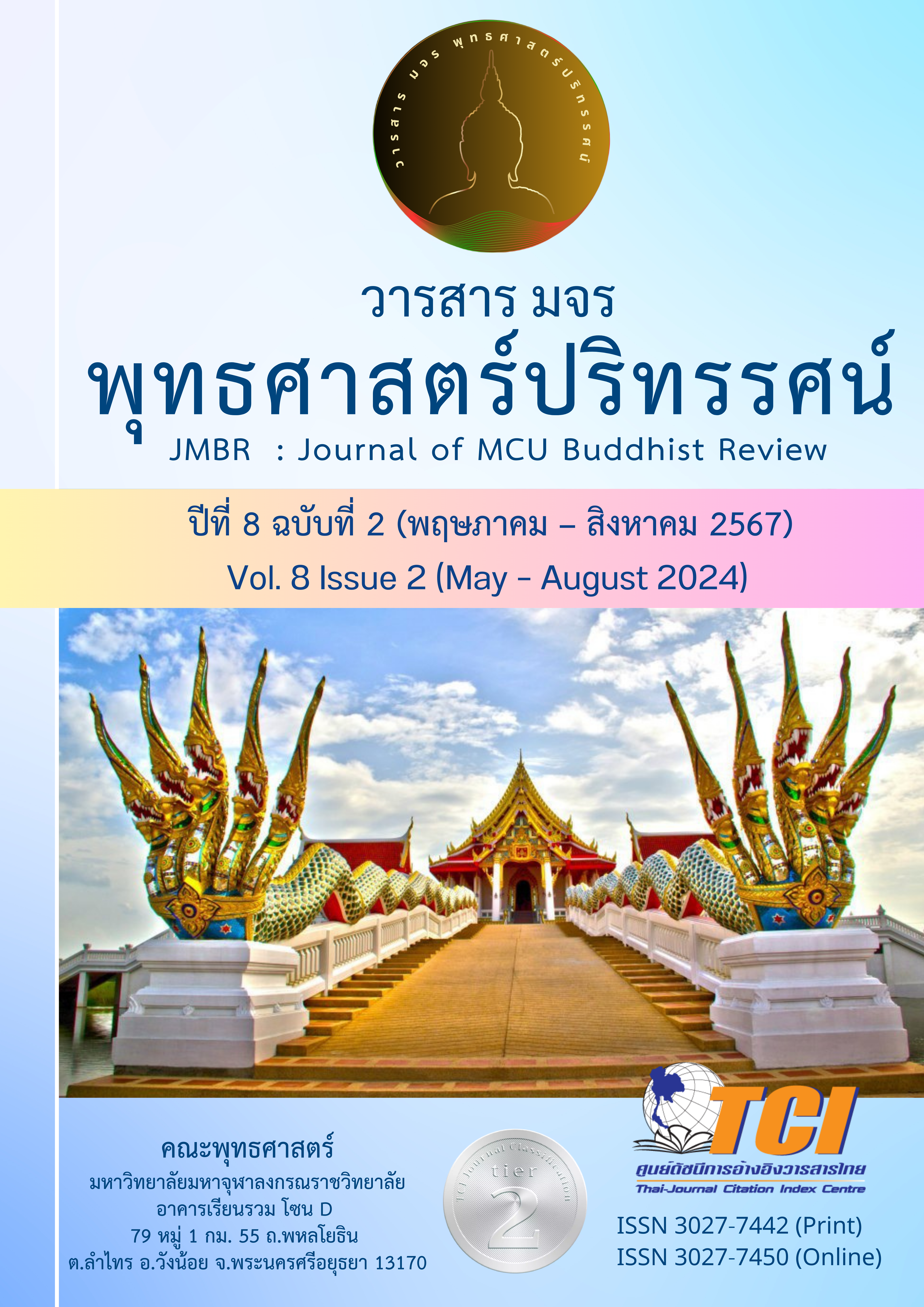วิเคราะห์หลักความเป็นบัณฑิตในมธุปิณฑิกสูตร
Main Article Content
บทคัดย่อ
บทความวิจัยนี้มีวัตถุประสงค์ 1) เพื่อศึกษาโครงสร้างและสาระสำคัญในมธุปิณฑิกสูตร
2) เพื่อศึกษาความเป็นบัณฑิตในมธุปิณฑิกสูตร 3) เพื่อวิเคราะห์ความเป็นบัณฑิตในมธุปิณฑิกสูตร เป็นการวิจัยเชิงคุณภาพ ด้านเอกสาร วิเคราะห์ข้อมูลโดยใช้การศึกษาเชิงคัมภีร์ทางพระพุทธศาสนา
ผลการวิจัยพบว่า) มธุปิณฑิกสูตรอยู่ในพระสุตตันตปิฎก มัชฌิมนิกาย มูลปัณณาสก์สีหนาทวรรค พระพุทธเจ้าทรงแสดงอุทเทสแล้วพระมหากัจจานะแสดงภาคนิทเทส สาระสำคัญที่ปรากฏในพระสูตร คือ ปปัญจสัญญาสังขาย่อมครอบงำบุรุษ แต่ถ้าบุรุษไม่หลงยึดในอายตนะ 12 ก็จะทำให้อนุสัย 7 ประการสิ้นสุด 2) คุณสมบัติของบัณฑิตในพระไตรปิฎก คือ คุณสมบัติด้านสติปัญญา ได้แก่ สุตมยปัญญา จินตามยปัญญา ภาวนามยปัญญาหรือมหาปัญญา และคุณสมบัติด้านจริยา คือ การไม่เป็นผู้ล่วงละเมิดทางด้านกายและด้านวาจา โดยวิธีการปฏิบัติทางกาย ได้แก่ การสำรวมอินทรีย์ และการปฏิบัติทางใจ ได้แก่ การปฏิบัติสมถกรรมฐานและวิปัสสนากรรมฐาน 3) จุดมุ่งหมายของบัณฑิตในมธุปิณฑิกสูตร คือ การแก้ปัญหาสิ่งที่เป็นแก่นสารของชีวิตเพื่อนำไปสู่การหลุดพ้น ส่วนหลักธรรมที่สงเคราะห์ ได้แก่ 1) ความฉลาดในธาตุมีประการต่าง ๆ คือ ธาตุ 18 มีจักษุ รูป จักษุวิญญาณ เป็นต้น ธาตุ 6 ได้แก่ ดิน น้ำ ไฟ ลม อากาศ วิญญาณ ธาตุ 6 ได้แก่ สุข ทุกข์ โสมนัส โทมนัส อุเบกขา อวิชชา ธาตุ 6 ได้แก่ กาม เนกขัมมะ พยาบาท ไม่พยาบาท เบียดเบียน ไม่เบียดเบียน ธาตุ 3 ได้แก่ กาม รูป อรูป ธาตุ 2 ได้แก่ สังขตธาตุ อสังขตธาตุ 2) ความฉลาดในอายตนะ 12 ได้แก่ อายตนะภายนอก 6 ภายใน 6 3) ความฉลาดในปัจจยาการ คือ การเห็นความจริงที่ทำให้ผู้นั้นหลุดพ้นจากทุกข์ทั้งปวง 4) ความฉลาดในเหตุและมิใช่เหตุ ฐานะ หมายถึง การยอมรับในสิ่งที่เป็นไปได้และสิ่งที่เป็นไปไม่ได้ เช่น ทำดีย่อมได้ผลดีและไม่มีทางที่จะได้ผลชั่ว เป็นต้น หลักความเป็นบัณฑิตสามารถนำไปประยุกต์กับการสอนเยาวชนเพื่อให้รู้เท่าทันกระแสสังคมจาก Social Media ได้ บัณฑิตที่พึงประสงค์จึงไม่ใช่แค่การเรียนสำเร็จในความรู้ทางโลกแต่จะมีวุฒิภาวะทางอารมณ์ด้วย
Article Details

อนุญาตภายใต้เงื่อนไข Creative Commons Attribution-NonCommercial-NoDerivatives 4.0 International License.
- บทความที่ได้รับการตีพิมพ์เป็นลิขสิทธิ์ของวารสาร มจร พุทธศาสตร์ปริทรรศน์
- ข้อความใดๆ ที่ปรากฎในบทความที่ได้รับการตีพิมพ์ในวารสาร ถือเป็นความรับผิดชอบของผู้เขียนบทความ และข้อคิดเห็นนั้นไม่ถือว่าเป็นทัศนะและความรับผิดชอบของกองบรรณาธิการวารสาร มจร พุทธศาสตร์ปริทรรศน์
เอกสารอ้างอิง
พระมหาสมบูรณ์ สุธมฺโม. (2556). หลักสูตรอารยชน. กรุงเทพฯ: มหาวิทยาลัยมหาจุฬาลงกรณราชวิทยาลัย.
พระเมธาวินัยรส (สุเทพ). (2564). คุณลักษณะบัณฑิตที่พึงประสงค์ในศตวรรษที่ 21 ตามแนวไตรสิกขา. วิทยานิพนธ์ระดับพุทธศาสตร์มหาบัณฑิต บัณฑิตวิทยาลัย: มหาวิทยาลัยมหามกุฎราชวิทยาลัย.
พระมหาจำนงค์ ขนฺติพโล. (2555). ศึกษาหลักปปัญจธรรมในมธุปิณฑิกสูตร. วิทยานิพนธ์พุทธศาสตร์ มหาบัณฑิต บัณฑิตวิทยาลัย: มหาวิทยาลัยมหาจุฬาลงกรณราชวิทยาลัย.
พระสมชาย ฐานวุฑฺโฒ. (2541). มงคลชีวิต ฉบับธรรมทายาท. ปทุมธานี: ฐานการพิมพ์.
พาสนา จุลรัตน์. (2548). จิตวิทยาการศึกษา. กรุงเทพฯ: มหาวิทยาลัยศรีนครินทรวิโรฒ.
มหาจุฬาลงกรณราชวิทยาลัย. (2539). พระไตรปิฎกภาษาไทย ฉบับมหาจุฬาลงกรณราชวิทยาลัย. กรุงเทพฯ: มหาจุฬาลงกรณราชวิทยาลัย.
มหาจุฬาลงกรณราชวิทยาลัย. (2560). อรรถกถาภาษาไทย ฉบับมหาจุฬาลงกรณราชวิทยาลัย. กรุงเทพฯ: มหาจุฬาลงกรณราชวิทยาลัย.
แม่ชีดวงใจ กุทอง. (2557). ศึกษา ขันธ์ 5 และอายตนะ 12 ในการเจริญวิปัสสนา. วิทยานิพนธ์พุทธศาสตร์มหาบัณฑิต บัณฑิตวิทยาลัย: มหาวิทยาลัยมหาจุฬาลงกรณราชวิทยาลัย.
ทองย้อย แสงสินชัย. (2545). บาลีวันละคำ. สืบค้น 9 เมษายน 2567 จาก https://dhamtara.com/?p=4495.
ธรรมวลี ศรีแช่ม. (2554). การศึกษาปปัญจธรรมในพระพุทธศาสนาเถรวาท. วิทยานิพนธ์พุทธศาสตร์ มหาบัณฑิต บัณฑิตวิทยาลัย: มหาวิทยาลัยมหาจุฬาลงกรณราชวิทยาลัย.
บรรจบ บรรณรุจิ. (2550). อสีติมหาสาวก. กรุงเทพฯ: มหาจุฬาลงกรณราชวิทยาลัย.
บรรจบ บรรณรุจิ. (2545). ปฏิจจสมุปบาท. กรุงเทพฯ: พรบุญการพิมพ์.
สมชาติ กิจยรรยง. (2562). การศึกษาความต้องการคุณลักษณะของบัณฑิตที่พึงประสงค์ของผู้ประกอบการ. รายงานวิจัย บัณฑิตวิทยาลัย: มหาวิทยาลัยจุฬาลงกรณ์มหาวิทยาลัย.


